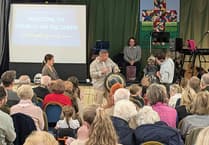MALORIE Blackman’s Noughts and Crosses book series, first published more than 20 years ago, highlights racism in all its ugliness – and the author says, sadly, it is still relevant today.
The books were turned into a six-part TV drama and now will be acted out on stage thanks to an adaptation by poet, playwright and performer Sabrina Mahfouz.
Published in 2001, the first book in the series introduces readers to an alternative reality in which white-skinned people, the Noughts, and dark-skinned people, the Crosses, are segregated, with the Crosses having more power in society.
The story focuses on the relationship between Sephy, a Cross, and Callum, a Nought.
“It was a book I was compelled to write,” says London-born Blackman, who is black. “It was my 50th book and I wanted to address racism and its legacy directly.
“I was also inspired by the Stephen Lawrence case. I was appalled by the way the Lawrence family had been treated, especially by the police, and I wanted to write something about what it's like to be judged based on the colour of your skin.
“What I thought might be one book, and then three books, eventually turned into six books and three novellas. My husband says it's the longest trilogy on the planet.”
She says she had a strong idea about the two main characters from the start.
“I think Callum is an idealist and believes in fighting injustice and righting wrongs,” explains the author. “He's explored every other avenue and the only way to get justice for the Noughts is to join what he calls a freedom fighter group.
“Once he joins it, he ends up doing things that are contrary to who he is innately. His point of view is that you do what you have to do, in order to survive.
“Sephy is very sheltered and naïve. She has had a very privileged upbringing and it's only through her friendship with Callum that she realises there's a whole other world out there that's not quite as privileged as she is.
“They've grown up together as friends, and it’s about how their friendship turns into a love affair.
“It’s also about how she learns about the real world through her friendship with Callum and realises that she has some points of view that she didn't even appreciate were prejudiced until seeing Callum’s responses to them and how people respond outside of her own social circle.”
Blackman says that the TV series and the stage play retain the essence of her original story, adding: “It does speak to the times we're in. It’s important to remember that Noughts and Crosses is also a story about class, though, obviously, it was inspired by Romeo and Juliet.
“It was very important for me to say that sometimes love isn't enough but, at the same time, we always have hope. Hope for the next generation.”
The Pilot Theatre’s production of Noughts and Crosses is at the Yvonne Arnaud Theatre in Guildford until tomorrow night (15 October).




